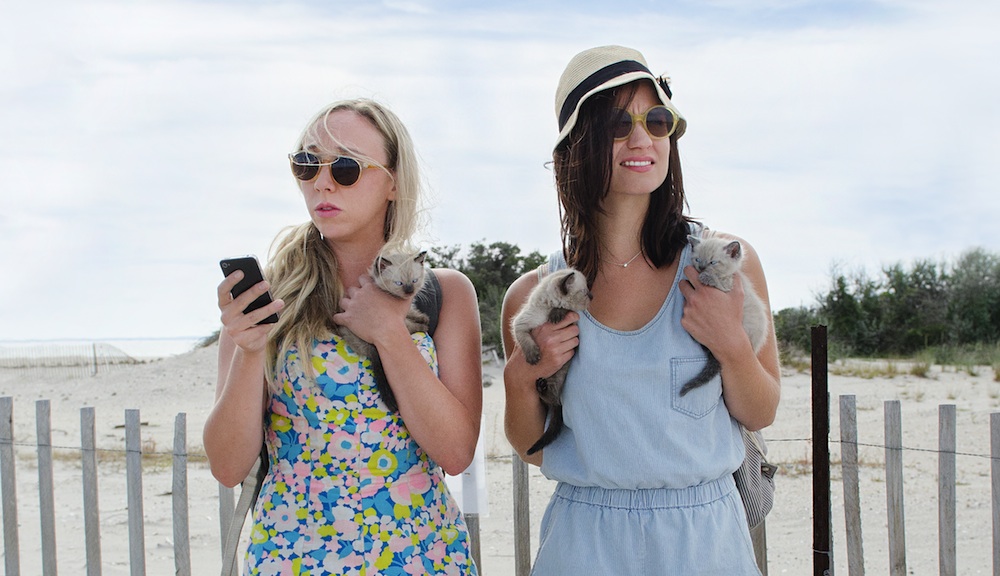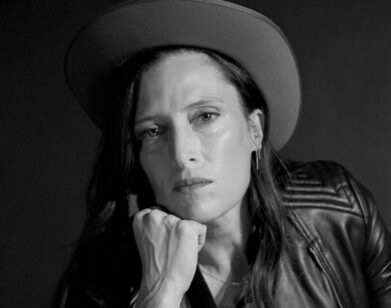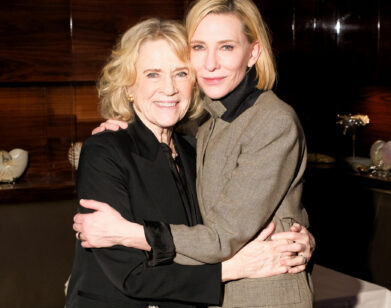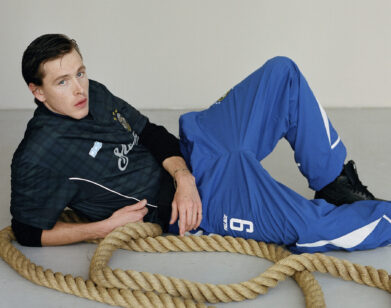Hipster Angst

ABOVE: CLARE MCNULTY AND BRIDEY ELLIOTT IN FORT TILDEN. PHOTO COURTESY OF BRIAN LANNIN.
It’s the beach day from hell in writer-directors Sarah-Violet Bliss and Charles Rogers’ feature debut, Fort Tilden. After meeting a pair of cute hipster boys at a rooftop party in Williamsburg, 20something best friends and roommates Harper (Bridey Elliott) and Allie (Clare McNulty) agree to meet them beachside the next morning. In this case, it’s easier said than done. After reluctantly borrowing a bike from their creepy neighbor and purchasing some MDMA from an ex-flame, just about everything that can go wrong on their ride to Fort Tilden does.
The thing is, it’s hard to feel bad for Harper and Allie. Harper (perhaps staying a little too true to her name) is bossy and judgmental-a spoiled artist still living on Daddy’s dime. Allie is her earnest sidekick; at Harper’s insistence, she bails on a mandatory meeting with her Peace Corps rep (though that won’t stop her from telling everyone she’s altruistically moving to Liberia). Less a slap-stick misadventure and more a satire on privilege and middleclass millennial culture, Fort Tilden is intelligent, quippy, and sure to hit close to home for anyone of the Williamsburg-Bushwick set.
We recently chatted with Elliott and McNulty about quarter-life crises, filming guerilla-style, and repping New York’s biggest borough.
BENJAMIN LINDSAY: How did you each first get involved with the film? I know you, Clare, went to Oberlin with Sarah-Violet?
CLARE MCNULTY: Yeah, I’ve known Sarah-Violet since my freshman year of college. I was in some of her short films when she was at NYU, and that’s where I met Charles. When they came up with this film, they asked me to come in and do a reading of it for their professors at NYU. They were well on their way to shooting the film and they were doing this reading just to get some feedback. After that, they asked me to come onboard.
BRIDEY ELLIOTT: And I didn’t know either of them beforehand. Charles found me on the Internet and just watched my videos. They went to one of my comedy shows. They kind of had me in mind for the character, so we met, I read the script, and I loved it. I was so pleasantly surprised because I didn’t know them at all so I didn’t know what I was getting into. But I loved it so much that I couldn’t say no.
LINDSAY: Did you two know each other before filming? You have such great chemistry.
MCNULTY: No, we didn’t know each other. We were introduced on sort of a blind date over Chinese food. We didn’t have a lot of time to get to know each other. We had maybe one rehearsal before we started shooting. It helped us just do it because we didn’t have a prior history, we weren’t friends before, so we got to be the characters right away and just create the history there. And because it was sort of guerilla filmmaking, we were in a lot of crazy situations that allowed us to become close pretty fast.
LINDSAY: This is Sarah-Violet and Charles’ feature-length debut. Did the cast and crew’s general freshness in the industry at all enhance or influence filming?
MCNULTY: Definitely. We all knew we were working hard for something that we were all really excited about. There were inconveniences that I think other people wouldn’t have been as willing to manage, but anytime there was an inconvenience it made the film better, and we were all really excited about the movie and part of that was that it was our first feature.
ELLIOTT: Yeah, it was very cool. There was an instant camaraderie.
LINDSAY: What do you think of the dynamic between Allie and Harper? It’s not the healthiest of relationships.
ELLIOTT: When I read it, it just immediately felt really real and honest and like friendships in the past where I’ve been the Harper or I’ve been the Allie. I have an older sister that I very much looked up to when I was younger, and we definitely had our misadventures. I thought a lot about that relationship in this. There’s just so much truth in the toxic best friend—I think we’ve all had one.
LINDSAY: I think we all have people in our lives that are very much like Harper and Allie in other ways: stuck in adolescence in their mid-20s, lost souls and not really knowing what they want to do. Could you relate to their quarter-life crises?
MCNULTY: I joke about the line where Allie says, “I want to go to law school or do acupuncture.” That’s something that I’ve said aloud in reality. And I’ve certainly had characteristics of a quarter-life crisis, but it’s not the only part of Allie that I identify with. There are other more subtle, broader things about her that I identify with, too. Fear of moving forward, fear of making decisions, inability to be truthful with oneself.
LINDSAY: In terms of her inability to be truthful with herself, why do you think she fools herself for so long about going into the Peace Corps?
MCNULTY: I think it’s better to have something rather than nothing. She is going to do that as long as she can make herself believe that it’s something that’s going to happen. She’s not going to go through the really difficult work of figuring out her actual place in the world. At the deepest level of her, she knows that she’s not right for it, which is why she ends up not going, but all of the other levels are screaming at her that she should be the person who’s right for the Peace Corps. So as long as she fools herself, she doesn’t have to do the work of figuring out how to be a better person.
ELLIOTT: But what our parents and past generations didn’t go through is this sort of constant social media where we’re always asking ourselves who we are and trying to create an identity. I think that’s at the core of their problems: Who am I? The pressure to have that figured out by 25 is real. And Brooklyn is a boiling pot of that.
LINDSAY: So is the film’s portrayal of the modern day 20something meant to be a criticism?
ELLIOTT: I think it’s a satire and it’s a portrait. You’re just kind of glimpsing into one day. They don’t change by the end of this movie, but there’s a glimpse of possible change. There’s potential in them. I don’t think it’s criticizing them, but it’s exposing them, for sure.
MCNULTY: A friend of mine who watched it said it was “confronting” to them, which I think is a good way to think about it. One of the wonderful things about the writing is that it can be critical and empathetic at the same time. Those things don’t have to be mutually exclusive.
LINDSAY: Still, they’re not very likable. While they’re stagnant in their own lives, why do you think they’re so quick to judge others?
ELLIOTT: I think it just all comes back to their insecure, anxious fear. They’re judging other people so harshly because she doesn’t even have the courage to take that step—that baby step of writing a song and performing it. It’s a merry-go-round Harper rides in her head where she has an idea, there’s a spark, but then her own fear and anxiety of not having it go well and being judged puts it down. She blocks herself. The judgmental thing comes from where it comes from for everybody: insecurity.
FORT TILDEN OPENS IN LIMITED RELEASE TOMORROW, AUGUST 14.






